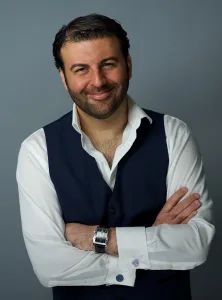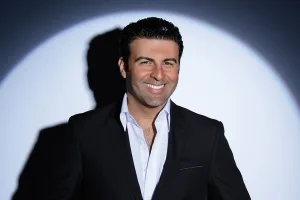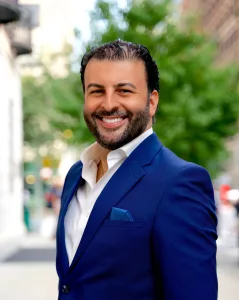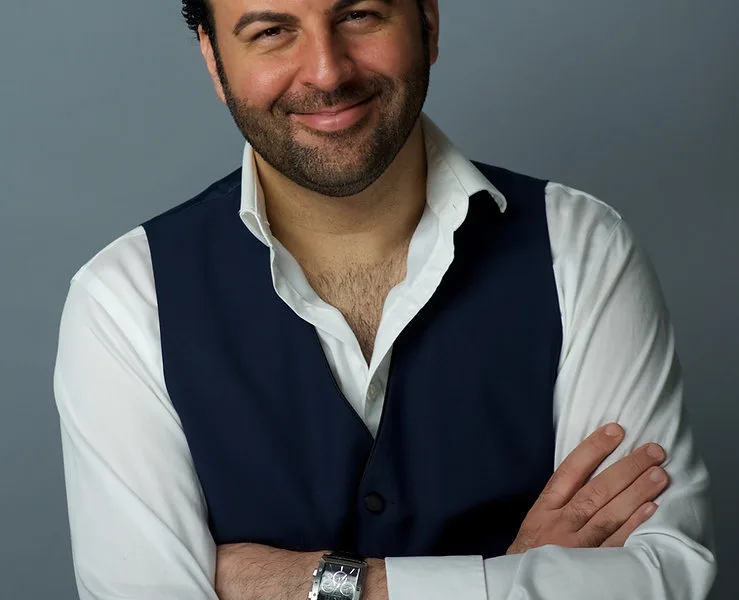Renowned David Serero, the renowned opera singer, embodies a remarkable fusion of talent and cultural heritage. Born in the heart of Paris to a Moroccan Jewish family hailing from Fez, Serero's musical journey has been nothing short of extraordinary. His passion for music began with the study of jazz piano at the American School of Modern Music and the Bill Evans Piano Academy in Paris, culminating in his graduation as a pianist and arranger.
Venturing to New York in 2001, he immersed himself in the world of singing, learning from Broadway and Metropolitan Opera mentors, and honing his acting skills at the HB Studio. Here, he tackled iconic roles, from Stanley in Tennessee Williams' "A Streetcar Named Desire" to Uncle Louie in Neil Simon's "Lost in Yonkers" and Marc Anthony in Shakespeare's "Julius Caesar."
Serero's artistic odyssey took an international turn when he relocated to St. Petersburg, Russia, where he studied at the prestigious Rimsky-Korsakov Music Conservatory. It was here that he made his operatic debut, commanding the roles of Scarpia in "Tosca" and Germont in "La Traviata." His exceptional talents earned him an invitation from Valery Gergiev to join the Young Singers Academy of the Mariinsky Theater.
In recognition of his dedication to promoting diversity in the arts, Serero was awarded the UNESCO Diversity Award in 2020. His life and career serve as a testament to the power of music to transcend boundaries and bring the world together. David Serero, the prodigious opera singer, continues to enchant audiences worldwide with his unparalleled talents and commitment to fostering inclusivity in the realm of performing arts.

Your career has spanned across opera, theatre, film, and music production. How do you excel in such diverse artistic fields, and what drives your passion for each of them?
Thank you so much! It’s all the same profession and artistic field for me: bringing people together and collaborating to make a unique human adventure full of unforgettable emotions. The one thing I get is that all the experiences I learn from one field help me improve the other. The fact that I make films enabled me to care more about the visual aspect of shows. The fact that I do comedy and acting on stage got me a sense of rhythm for my movies, as I feel the audience’s reaction, etc.
You've performed in prestigious venues worldwide, from the Paris Opera Garnier to Carnegie Hall in New York. Can you share a memorable performance experience that stands out to you?
All experiences stand out; I learned more about performing back in the days in a restaurant in front of eight people than in front of five thousand. All are memorable from the moment you understand that you are doing what you love and there is no other place I’d rather be, and you’d be willing enough to learn and analyse after each show and grow from it. I’m proud to say that I became fearless on stage since I tried every style and genre of performance, from opera to classic theatre to standup comedy. There are no roles that I can not do. Regardless of the venue, the part you sing gets you going!
Your repertoire includes over 50 lead roles in opera, operetta, and musical theatre. Is there a role or character that you feel exceptionally connected to, and why?
All my roles come at the right time because of how I stand in my life. It’s a perfect match-making. It’s like meeting a woman; she always comes at the right time of your life. I’ll mention Shylock, Othello, and Cyrano in classical theatre as my top best roles. You don’t take anything from the role if you don’t enter it at its core, and it’s a long process. I took so much from all the parts I played, and it inspires me every day. Shylock and Othello taught me about not seeking revenge for a betrayal. Cyrano taught me that if you feel not pretty, get admirable in everything else. I could write an entire book about each role I played as I lived with and by them. I’m always very sad when I finish a production because I say goodbye to that role, that person that I lived in and with for a few months. But he always stays in my mind and heart and sometimes returns.
You've directed and produced nearly 100 theatrical productions. What do you find most rewarding about being behind the scenes, shaping the creative vision of a show?
I’m on most of the time on the scene as well by performing! (laughs) It was my original signature: to adapt material, direct, produce, and play a role. Though I have a lot of solo concerts worldwide, I always need to come back to bring the group effort. It’s what I live for. When you direct, give, teach, and share, the reward is that you learn a lot. You can witness creation occurring when no actors know each other and the stage is empty. Suddenly, bounds are created, and stories are taking life, and the next thing you know, the audience applauds it. Nothing else in the world brings you this.
In 2022, you created the first national opera of Morocco, L'Opera Royal du Maroc. Can you tell us about this project and its significance?
Thank you so much for talking about it, especially knowing about the recent tragedy in Morocco. But through the darkness, Morocco shows its best feature: solidarity. As always, this story started with me seeing something missing and creating it. I wanted to bring something to Morocco and contribute to this beautiful country that has done so much for its people. I chose to do it with opera, and it took me a year to put it together; I succeeded wildly against everyone’s advice and even people trying to have me fail. That is not knowing me well. Now, Morocco has its first National Opera Company, entirely dedicated to His Majesty, The King of Morocco, and the people of Morocco. I have commissioned the first opera in the Darija language (Moroccan dialect) based on a Moroccan theme, and more Moroccan adaptations are scheduled for 2024. I finished a documentary showing the journey of this fantastic adventure. The emotion I had at the historical opening night gala, seeing the whole audience standing up to applaud, and that I managed to offer the dream of many young Moroccan singers someday singing opera in Morocco was an emotion I’d never forget. I never cried that much on stage.

You've won numerous awards, including the BroadwayWorld Awards and the UNESCO Award for Diversity. How do these recognitions impact your artistic journey?
I’m very honoured by it reassures me that all the sacrifices and hard work do pay off someday. It keeps me going and doing more and reaching higher. Each award makes you celebrate something particular. People see the headlines but not the sacrifices and the perfectionism that is behind them. These awards are deeply valued in my heart and I’ll cherish them forever.
Your documentary film on fashion designer Elie Tahari received widespread acclaim and awards. What inspired you to explore the world of fashion through film, and do you have plans for more documentary projects?
During COVID, I was without any shows and concerts, which is impossible for a workaholic like me. I knew directing movies was my next step, and COVID just anticipated it. I knew Elie Tahari when I invited him to the New York Sephardic Jewish Film Festival, which I produced, to receive an Award. We became friends, and one day, I offered him to make a movie about his life. It was also the perfect time for him as he was off during COVID-19. I put all my heart into it and learned the craft of filmmaking on the spot, including editing (I edit all my films). Following the success of it, I have nearly 12 movies now. Some are currently in the film festival circuit, and I am going into many styles and taking the documentary style in another direction.
You've performed in multiple languages and musical genres as an artist. How do you approach interpreting and performing in different languages and styles?
Each language is another rhythm and spirit. I performed the same roles in English, French, Italian, and even Russian, and I can assure you that it’s a different role with the language difference, though the story remains the same. It also depends on the country where you perform. Performing Shakespeare in the US and France is not the same. Performing in a language other than your own is so rewarding and allows you to express different things.
You're known for your philanthropic work, including benefit concerts for UNICEF and shows for children in hospitals. How important is giving back to the community in your career?
When you receive it, you need to give back. But to me, it always comes from the people you meet. Every time an organisation required my help, I was always present. I also reached out to several organisations to offer my help and contribution. Helping others humbles you. It keeps you grounded, and that’s important. I don’t take myself seriously at all but I do take my work very seriously.
What can your fans and audiences look forward to in the future? Are there any upcoming projects or performances you'd like to share?
I am excited to bring back to New York "Anne Frank, a Musical” written by Jean-Pierre Hadida, following its sold-out success in 2019. Then I’ll bring my play “The Trial of Eichmann,” which shows something never done before on stage. Several productions for the Royal Opera of Morocco. New editions of several festivals that I have created worldwide. I’m also filming several films with some of the most renowned actors in France. A new solo album of mine is coming out this Fall, as well as several Cast Album Recordings. Then I’ll bring to the stage for 2024, the musical “Scarface, the Al Capone Musical” and I’ll return to play Napoleon back on stage in New York.
What Greek artists do you admire and would love to collaborate with? What do you think of the Greek music?
I was honoured to perform in Thessaloniki with one of the greatest pianists, Cyprien Katsaris. I can not wait to go back to Greece and perform there! Their music reflects their spirit of generosity and a happy life. One artist I wish I would have loved to meet was Maria Callas. I guess it’s too late…but you’ll find me in Mykonos dancing the Sirtaki next summer!



